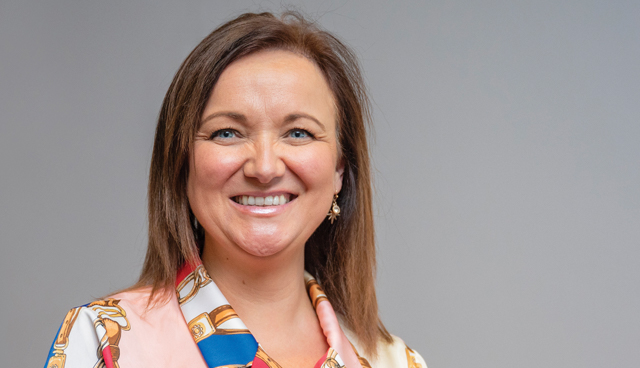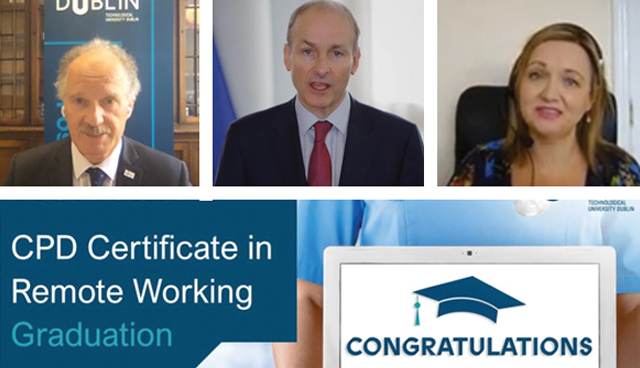Facilitating remote working in the health sector

Disruption caused by the Covid-19 pandemic has been pervasive and the Government’s subsequent public health policy heralded a sudden pivot to remote working. Ciarán Galway speaks with Assistant National Director for Digital Organisational Change within Health Business Services in the HSE, Maria O’Loughlin about the innovative responses to this new way of working from within the health sector.
When the Covid-19 crisis emerged, it was a scenario without precedence in the history of the State. Efforts were taken nationally and indeed internationally, to prevent the further spread of the virus. As a result, the Irish Government encouraged all employers to facilitate employees to work remotely where possible.
“When faced with the government instruction of having as many employees working remotely as possible, the organisational challenge required us to approach it from both a technical and a cultural perspective,” O’Loughlin explains, adding: “In response, the HSE collaborated with TU Dublin and Enovation to devise a tailored online training solution to support staff in their transition to remote working.”
Health Business Services (HBS) is the business division of the HSE tasked with providing high-quality business services and solutions globally across the health sector. Operating behind the scenes within the HSE, HBS plays a fundamental role delivering frontline services connecting, supporting and supplying colleagues, customers and clients across the Irish health sector.
Throughout the pandemic, there has been an increased awareness of the services provided by HBS. These range from HBS Procurement, tasked with sourcing and supplying critical PPE, to HBS Finance, closing out the deals put in place by Procurement, and from HBS Estates, rapidly expanding the capacity of health units across the country, to HBS HR, spearheading the national effort in terms of recruitment along with other business support programmes. “These teams were critical from a shared services perspective so it was vital they were enabled and supported to work remotely quickly,” the Assistant National Director outlines.
A significant majority, of these health sector employees had never worked from home before. “They were all office based and so weren’t enabled, from a technical perspective, to simply lift a laptop and head home. They were very confident and comfortable in an office environment but working remotely was a completely new environment and a considerable transition.
Technical
The first challenge, therefore, was ensuring that staff could work from home from a technical perspective. O’Loughlin and her team worked closely with the Office of the Chief Information Officer (OoCIO) within the HSE to facilitate HBS staff with the required technology.
“It had to be done quickly to ensure that there was no downtime between our business as usual and having our staff set up at home. We also worked with the OoCIO, who created instructional videos for staff to walk them through this process as well as providing telephone and online support. When providing this technical assistance, it became obvious that we needed to look at cultural supports for engaging and collaborating with staff, as well as supports for managers, in other words, we had to ask, ‘what does the future of work look like for us’?”
Cultural
After a strong engagement on the technical aspects of remote working, O’Loughlin and her team were faced with a cultural challenge. HBS then moved beyond simply supporting people who had received their laptops and other equipment, instead focusing on managers and leaders, as well as facilitating peer-to-peer support in remote working processes.
At this point, the Assistant National Director was introduced to the School of Management team at Technological University Dublin (TU Dublin), including Head of School Paul O’Reilly and lecturers Maébh Coleman, Rowena Hennigan and Marian Jennings.
“Maébh and her colleagues had previously been looking at a remote working module for the university itself. It became a question of how to take that module, tailor it to the HSE and then utilise it to support people undertaking critical jobs within the health service,” she reflects.
Prior to Covid-19, remote working within HBS was defined by individual members of staff working from outside their designated office as and when required. “The scenario now is a completely new way of working; the future of work. It is brand new and it comes with its own cultural complications as well. Across the entire healthcare service, no matter what someone’s discipline is, there was a requirement that they were confident in delivering their work from home,” O’Loughlin illustrates.

“When faced with the policy of having as many employees working remotely as possible, the organisational challenge required us to approach it from both a technical and a cultural perspective.”
Assistant National Director for Digital Organisational Change within Health Business Services in the HSE, Maria O’Loughlin
Remote working module
The HSE sought to produce a remote working module that could be readily implemented to deliver practical advice on a very user-friendly platform.
“We worked with TU Dublin to incorporate the Government’s guidance and contextualise the module in order to incorporate as much relevant information as possible. The module ranged from workplace ergonomics to managing the new way of working with dependents in the house. Within six weeks, the module was made available to staff,” she says.
In collaboration with Irish e-learning solutions company Enovation, a €1 million online training module was created and then offered to health sector staff working remotely. Deployed in May 2020, the course was available to all healthcare workers, north or south and TU Dublin facilitated students with a €500 fee waiver. Those who enrolled were then given three months within which to complete the course.
“We had great support from TU Dublin in discerning how we could utilise and interact with different learning environment scenarios. Both Enovation and TU Dublin waived their feeds, providing their services pro bono to help support healthcare staff.”
The launch attracted a huge uptake with almost 1,000 people from across the health sector registered in two days. At the close of registration, over 2,500 staff from across over 150 HSE departments, alongside employees from state bodies and charities, registered to undertake the module. Students ranged from administration staff to GPs and occupational health therapists to surgeons.
Online graduation
Those transitioning through the module were able to take up and drop the module as and when suited. After completing the course, the HSE students were awarded a Level 6 CPD Special Purpose Award in Remote Working.
“The feedback we’ve had has been incredible. People found it to be practical and easy to integrate into their new working environments. We had the online graduation in July 2020 and An Taoiseach, Micheál Martin delivered an address at this. 1,000 HSE healthcare personnel graduated, meaning that it was the largest programme graduation that TU Dublin has ever had,” O’Loughlin notes.
Congratulating those who had successfully completed the remote working course, An Taoiseach paid tribute to HSE staff and health workers.
“HSE and health workers have played a critical role during this pandemic and the dedication and commitment which you have demonstrated during these difficult months will never be forgotten. Today’s graduation was born out of Covid. It is an example of how people and organisations have had to adapt and respond to this unprecedented situation
“The pandemic forced many organisations and workplaces to rethink their traditional workplace models and explore how they could facilitate homeworking. In turn, initiatives like this have developed to build the capacity and confidence of those working from home. The success of this programme is remarkable,” he said.
Collaboration
For HBS, from both a technical and a cultural perspective, collaboration has been a significant enabler in the Covid-19 era. O’Loughlin expresses a commitment to continue along this journey, with the aspiration of developing sustainable solutions to support learning and development for staff and organisations.
Having launched the online training module, the HBS team were also developing remote working guidelines for staff which were then distributed among staff, alongside enhanced peer-to-peer support structures. “We then pulled together a programme of work across HBS and OoCIO examining the future of work. While the technical is important, culture also has great significance. This is about collaboration and innovation as well as the health and wellbeing of staff.
“That work is ongoing, and we are collaborating with different organisations, including Grow Remote, DCU and Qualtrics on creating a programme of work that will highlight areas of support needed by staff, departments and organisations by linking to a remote working maturity model that is in development by Grow Remote. There is a clear understanding that this is not specific to health or even specific to Ireland as we all attempt to navigate this new way of working,” she emphasises.
The idea behind the programme would be to create a benchmark that any organisation could use, so not just HBS, not just the HSE, but organisations across the public sector and indeed the private sector could avail of the learnings.
“We’re in the process of bringing that survey to fruition and aim to test it within HBS. From an organisational perspective, the rationale is to ensure that individuals receive sufficient support while remote working. After this point, pulse surveys could be used to measure developments and improvements against the maturity matrix,” O’Loughlin elaborates.
“The pandemic forced many organisations and workplaces to rethink their traditional workplace models and explore how they could facilitate homeworking. In turn, initiatives like this have developed to build the capacity and confidence of those working from home.”
An Taoiseach, Micheál Martin TD
Digital transformation
Pre-Covid-19, HBS was aware of the positive impact of digital transformation, while also being cognisant of how it influences the way it works, its processes, as well as its collaboration and innovation. “In the past, we have delivered other programmes of work which we will now re-examine from the future of work perspective,” O’Loughlin asserts.
For instance, alongside the Department of Communications, Climate Action and Environment, HBS developed the Ambassadors for Future Health Skills Programme. This was a foundational skills programme for digital literacy, delivered to small groups by a trainer, within the HSE, and comprised a HSE contextualised programme of work.
“Now, we’re looking at that programme and pivoting it to Covid-19 applications. Beforehand, we were delivering a foundational skills programme, now we’re revising this to consider teaching staff how to use Microsoft teams, how to access the social media platforms we use to update Covid-19 news, how to download the Covid-19 app and more.” she adds.
While acknowledging that remote working is not an option for every job, O’Loughlin emphasises that the Covid-19 pandemic has demonstrated its effectiveness, when utilised appropriately. “This is a new way of working that has been rapidly embraced all over the world, we now need to ensure that our people are not only surviving but are actually thriving in this new environment. Now is the time to be committed in building and progressing a meaningful culture that will retain and attract the professional and skilled workforce required to power our organisation,” she concludes.





